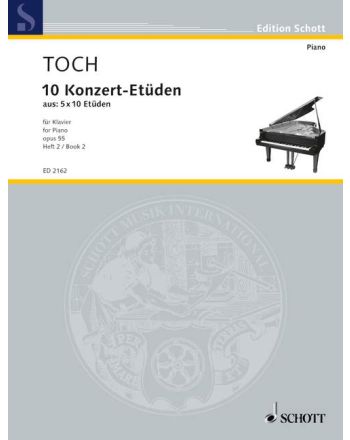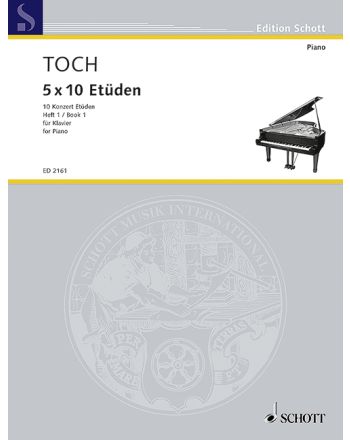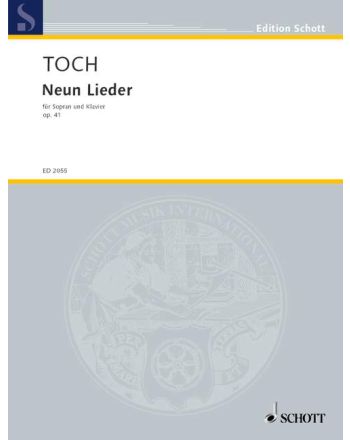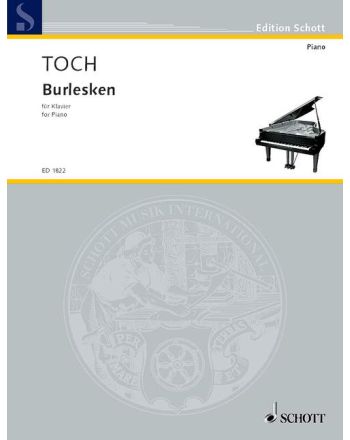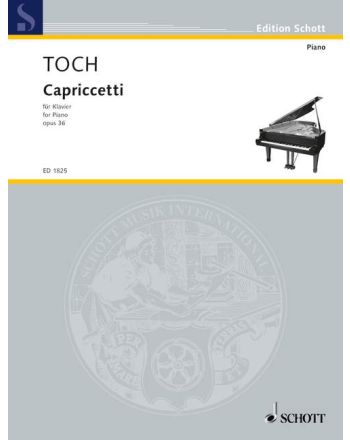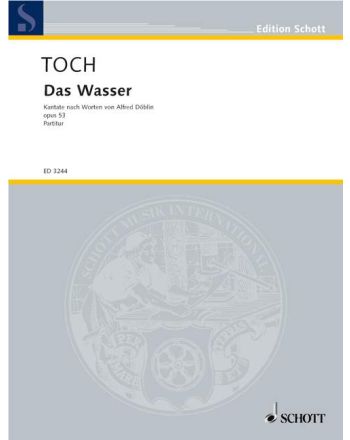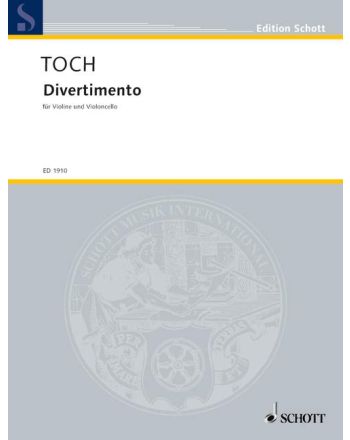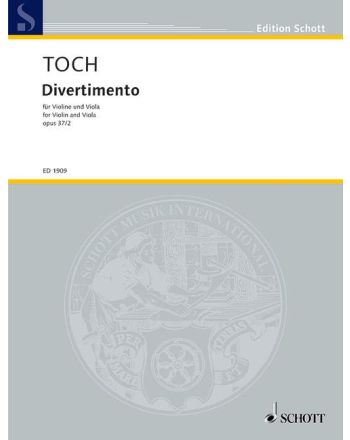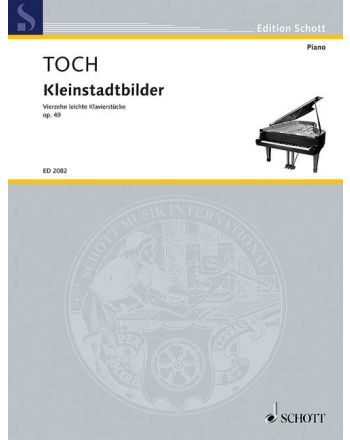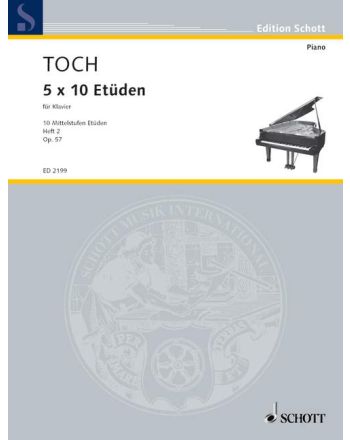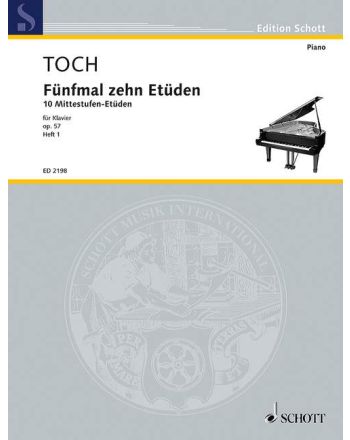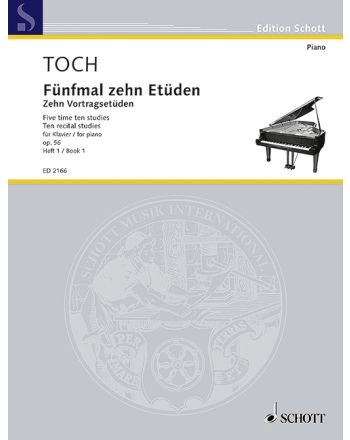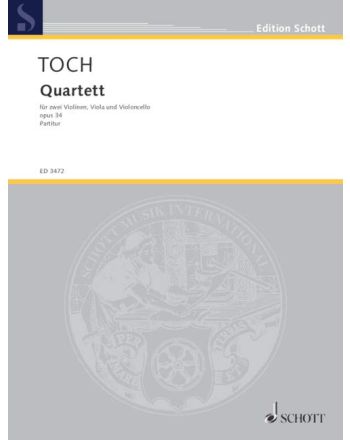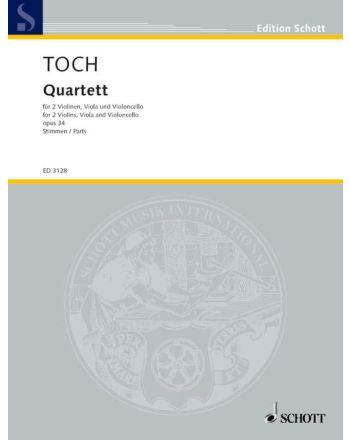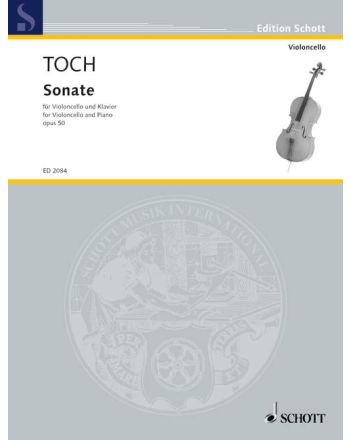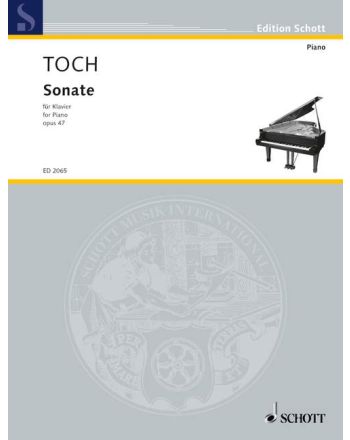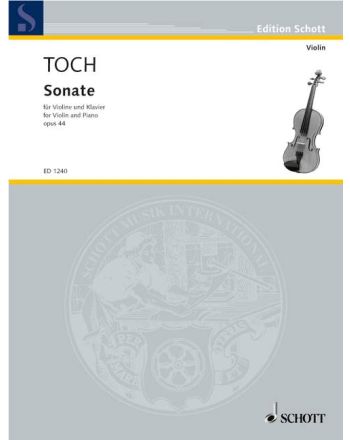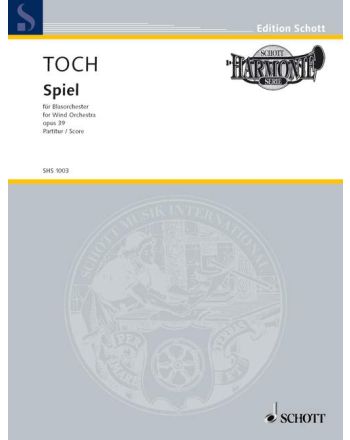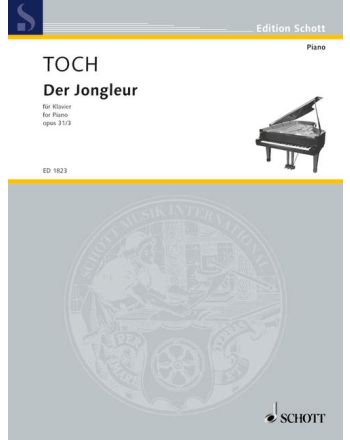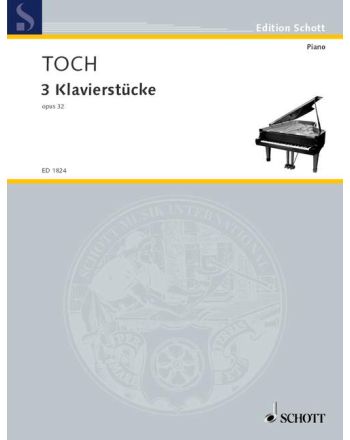
Ernst Toch
About Ernst Toch
Ernst Toch was born on 7 December 1887 as son of a Jewish merchant in Vienna. At an early age, he taught himself the basic knowledge of music and composition, primarily writing chamber music. The music of the then seventeen-year-old became known all over Vienna when his String Quartet No. 6 was performed for the first time by the Rosé Quartet. Despite this success, Toch enrolled at the University of Vienna for medicine, not for music. After winning the Mozart Prize of the City of Frankfurt (1909) he dropped out of his medical studies to begin studying the piano and composition in Frankfurt. In 1912 he became a teacher at the Mannheim Musikhochschule where he taught composition and music theory until 1928. In 1921 he graduated from the University of Heidelberg with the thesis Beiträge zur Stilkunde der Melodie.
At the Donaueschingen Festival for Contemporary Chamber Music, works by Toch were performed which turn away from the Romantic style and are characterized by the New Objectivity that also characterizes the dramatic works The Princess of the Pea (1927) and Egon und Emilie (1928). In 1929 Toch moved to Berlin. Thanks to Erich Kleiber’s concerts of the Theater-Suite, his music became very popular in America too from 1932. Serge Koussevitzky invited Toch to perform Piano Concerto No. 1 with the Boston Symphony Orchestra. This invitation was followed by a tour of the USA which smoothed the way for his future successes in America.
His second piano concerto, the Sinfonie für Klavier und Orchester (1932), was banned by National Socialist ’anti-Bolshevists’, who sabotaged the scheduled performances. The premiere could instead take place in London at the BBC Proms 1934 with Toch as a soloist. In May 1933, after the Nazi Party (NSDAP) seized power, Toch moved to Florence. From there, he emigrated to London and in 1934 to New York where he taught at the New School for Social Research. In 1936 he was appointed Professor of Composition and Music Theory at the University of Southern California at Santa Monica. In 1940 he became a US citizen. Toch wrote eleven works for the film production company Paramount; in the years 1935, 1941 und 1944, his music was nominated for the Oscar. Among his most famous film musics is Hallelujah from The Hunchback of Notre Dame.
Around 1950, Toch started to compose concert music again, writing seven symphonies, among others, in which he returned to the musical language of the compositions created in his youth. Like many other emigrants, he never succeeded to reestablish his position as a composer in Europe after such a long forced absence; his success remained confined to America. He won the Pulitzer Prize in 1957 for his Third Symphony and a Grammy Award (1960). Ernst Toch died on 1 October 1964.
Ernst Toch Archive of the University of California, Los Angeles.
Worklist
Gallery
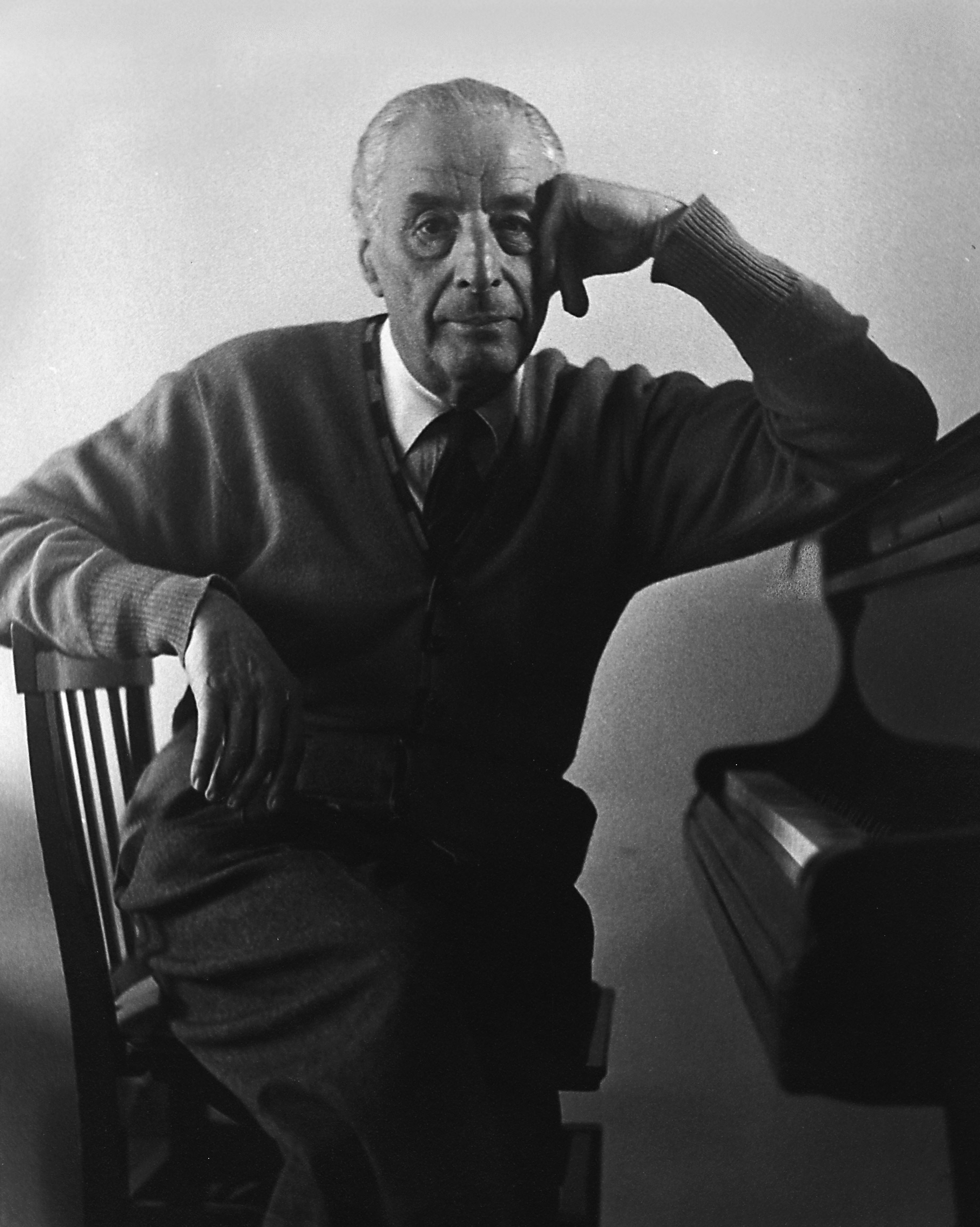

Products
-
für großes OrchesterHire/performance materialHire/performance material
-
Vol. 2 | Nos 6-10Composer: Ernst TochSeries: Edition Schott
10 Konzert-Etüden, Vol. 2
Instrumentation: pianoProduct number: ED 2162Product TypeIn stockAs low as €14.99Incl. Tax -
Print editionPrint editionIn stock€18.00Incl. Tax, Excl. Shipping
-
Vol. 1 | Nos 1-5Composer: Ernst TochSeries: Edition Schott
10 Konzert-Etüden, Vol. 1
Instrumentation: PianoProduct number: ED 2161Product TypeIn stockAs low as €13.99Incl. Tax -
Composer: Ernst TochSeries: Edition Schott
Instrumentation: Soprano and PianoProduct number: ED 2055Product TypeIn stockAs low as €19.99Incl. Tax -
für OrchesterHire/performance materialHire/performance material
-
Product TypeIn stockAs low as €13.99Incl. Tax
-
Product TypeIn stockAs low as €13.99Incl. Tax
-
Composer: Ernst TochEdition: Piano reduction with solo partSeries: Edition Schott
Konzert
Instrumentation: cello and chamber orchestraProduct number: ED 1993Product TypeIn stockAs low as €24.99Incl. Tax -
Composer: Ernst TochEdition: Study scoreSeries: Edition Schott
Konzert
Instrumentation: cello and chamber orchestraProduct number: ED 3473Product TypeIn stockAs low as €37.99Incl. Tax -
Musik zu Klabunds SchauspielComposer: Ernst TochMedia Type: Hire/performance materialEdition: Performance materialInstrumentation: orchestraHire/performance materialHire/performance material
-
CantataComposer: Ernst TochEdition: Study scoreSeries: Edition Schott
Das Wasser
Instrumentation: baritone, speakers, mixed choir and instrumentsProduct number: ED 3244Product TypeIn stockAs low as €26.99Incl. Tax -
Kantate nach Worten von Alfred DöblinComposer: Ernst TochMedia Type: Hire/performance materialEdition: Performance materialLanguage: GermanHire/performance materialHire/performance material
-
Opern-Capriccio in drei Akten und vier BildernHire/performance materialHire/performance material
-
Kleine Ouvertüre zu der gleichnamigen OperComposer: Ernst TochMedia Type: Hire/performance materialEdition: Performance materialInstrumentation: orchestraHire/performance materialHire/performance material
-
Eine Kammersinfonie für 14 Solo-Instrumente und Solo-SopranComposer: Ernst TochMedia Type: Hire/performance materialEdition: Performance materialLanguage: GermanHire/performance materialHire/performance material
-
Musikmärchen in einem AufzugComposer: Ernst TochMedia Type: Hire/performance materialEdition: Performance materialLanguage: GermanHire/performance materialHire/performance material
-
Vorspiel zu dem gleichnamigen MusikmärchenComposer: Ernst TochMedia Type: Hire/performance materialEdition: Performance materialInstrumentation: orchestraHire/performance materialHire/performance material
-
No. 1Composer: Ernst TochSeries: Edition Schott
Divertimento
Instrumentation: violin and celloProduct number: ED 1910Product TypeIn stockAs low as €17.99Incl. Tax -
No. 2Composer: Ernst TochSeries: Edition Schott
Divertimento
Instrumentation: Violin and ViolaProduct number: ED 1909Product TypeIn stockAs low as €14.99Incl. Tax -
14 easy PiecesProduct TypeIn stockAs low as €16.99Incl. Tax
-
Kein Familiendrama von Christian MorgensternComposer: Ernst TochMedia Type: Hire/performance materialEdition: Performance materialLanguage: GermanHire/performance materialHire/performance material
-
für großes Orchester und OrgelHire/performance materialHire/performance material
-
Vol. 2 | Ten studies of medium difficultyComposer: Ernst TochSeries: Edition Schott
5 x 10 Etüden, Vol. 2
Instrumentation: pianoProduct number: ED 2199Product TypeIn stockAs low as €13.99Incl. Tax -
Vol. 1 | Ten medium-range EtudesComposer: Ernst TochSeries: Edition Schott
5 x 10 Etüden, Vol. 1
Instrumentation: pianoProduct number: ED 2198Product TypeIn stockAs low as €14.99Incl. Tax -
für KammerorchesterHire/performance materialHire/performance material
-
Zehn VortragsetüdenProduct TypeIn stockAs low as €14.99Incl. Tax
-
für OrchesterHire/performance materialHire/performance material
-
für Orchester in einem SatzHire/performance materialHire/performance material
-
für Violoncello und KammerorchesterHire/performance materialHire/performance material
-
für Klavier und OrchesterHire/performance materialHire/performance material
-
für BlasorchesterHire/performance materialHire/performance material
-
Composer: Hans Gál | Paul Hindemith | Ernst Křenek | Ernst TochOrchestra/ensemble: Deutsches Symphonie-Orchester BerlinConductor: Roger EppleMedia Type: CDProduct number: WER 66412CDCDIn stock€18.50Incl. Tax, Excl. Shipping
-
auf einen Text von Rainer Maria RilkeComposer: Ernst TochMedia Type: Hire/performance materialEdition: Performance materialLanguage: GermanHire/performance materialHire/performance material
-
Ein Märchen für Orchester in drei TeilenHire/performance materialHire/performance material
-
Ein Märchen für Orchester in drei TeilenComposer: Ernst TochMedia Type: Sheet musicEdition: Study scoreSeries: Peter Pan
Instrumentation: orchestraProduct number: ED 4582Print editionPrint editionIn stock€21.50Incl. Tax, Excl. Shipping -
Composer: Ernst TochEdition: ScoreSeries: Edition Schott
Quartett
Instrumentation: 2 violins, viola and celloProduct number: ED 3472Product TypeIn stockAs low as €40.99Incl. Tax -
Composer: Ernst TochEdition: Set of partsSeries: Edition Schott
Quartett
Instrumentation: 2 violins, viola and celloProduct number: ED 3128Product TypeIn stockAs low as €47.99Incl. Tax -
Full recordings of five masterpieces for wind orchestraMedia Type: CDEdition: music examplesProduct number: T 4282CDCDIn stock€5.95Incl. Tax, Excl. Shipping
-
(2. Klavierkonzert)Hire/performance materialHire/performance material
-
Composer: Ernst TochSeries: Edition Schott
Instrumentation: violoncello and pianoProduct number: ED 2084Product TypeIn stockAs low as €18.99Incl. Tax -
Product TypeIn stockAs low as €18.99Incl. Tax
-
Composer: Ernst TochSeries: Edition Schott
Instrumentation: violin and pianoProduct number: ED 1240Product TypeIn stockAs low as €16.99Incl. Tax -
Composer: Ernst TochEdition: ScoreSeries: Edition Schott
Schott Harmony Series
Spiel
Instrumentation: wind bandProduct number: SHS 1003Product TypeIn stockAs low as €36.99Incl. Tax -
Composer: Ernst TochMedia Type: Sheet musicEdition: Set of partsSeries: Schott Harmony Series
Spiel
Instrumentation: wind bandProduct number: SHS 1003-70Print editionPrint editionIn stock€170.00Incl. Tax, Excl. Shipping -
in 6 SätzenHire/performance materialHire/performance material
-
from "Three Burlesques"Product TypeIn stockAs low as €9.99Incl. Tax
-
E-score PDFE-score PDFIn stock€5.99Incl. Tax
-
Product TypeIn stockAs low as €10.99Incl. Tax


